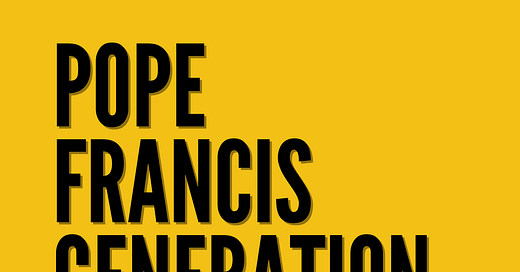Freedom, Newborns, and Hell
Catholics on Twitter and Facebook have been discussing universalism again, and that conversation overlapped with my unpacking of an experience I had when my fifth child was born last week.
A priest was arguing against universalism and defined freedom as “the ability to do otherwise.” He said universalism presumes that either God can't not love us or that ultimately, we can't not love God. And if we can't not love then we are not truly free.
I’m not sure freedom always means having the ability to do otherwise. That's not how I experience freedom in the real world.
In my experience, love, in a real sense, imposes on my freedom. Love makes it more difficult, at times perhaps impossible, for me to not love. But I would say that love ultimately makes me more free, not less.
This sarcastic tweet from Jordan Daniel Wood, a theologian who has written about universalism, is what made this line of thought about freedom overlap with my newborn baby.

When I first saw my new baby, half a second after he was born and the doctor was handing him to my wife, I loved him. My heart opened up and I just loved him. I didn’t really have a choice in the matter. His mere presence captured me, imposed on me. I didn't have the ability to do otherwise.
Maybe you could say his presence made me less free because I couldn’t not love him. But in another way it made me more free, more free to move past fear and selfishness in order to love him.
Love made me more free to love.
Love also didn't feel like an imposition because it was already my desire to love him, my heart was already disposed to love him.
I think there’s something important about grace here. Grace—God’s life and love and presence with me—captures me. It imposes on me. But while that imposition may make it more difficult for me to choose otherwise, it actually makes me more free. God's presence heals me of my fear and selfishness and frees me to love.
Maybe I could choose to resist grace. Maybe. My heart would need to be made of stone to resist loving my newborn when I first saw him. How much more stony must a heart be to resist God’s presence?
How much must my heart be habituated to hate and deceit and malice to resist God, to resist the very source of my being and the purpose for which all of me was created? Is that even possible? Maybe. I have to think it is because Pope Benedict said as much in Spe Salvi and that’s the traditional teaching of my faith. But I think that possibility may only exists in theory and not in reality.
I find this passage from St. Edith Stein realistic and compelling:
"All-merciful love can thus descend to everyone. We believe that it does so. And now, can we assume that there are souls that remain perpetually closed to such love? As a possibility in principle, this cannot be rejected. In reality, it can become infinitely improbable—precisely through what preparatory grace is capable of effecting in the soul."



